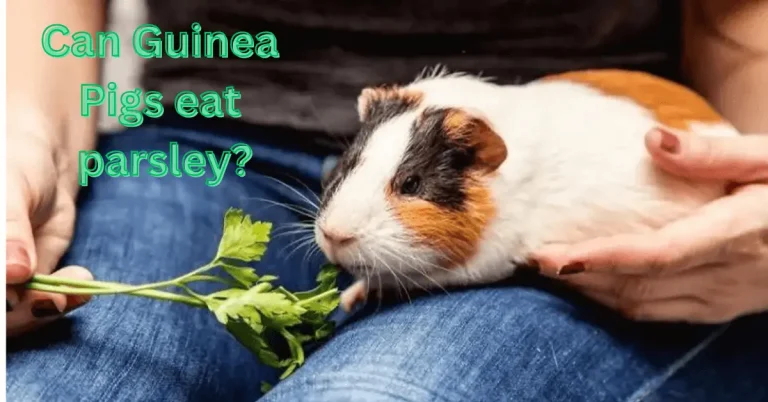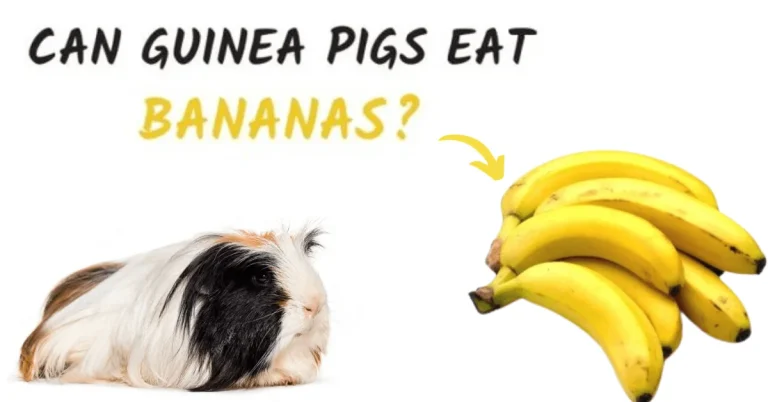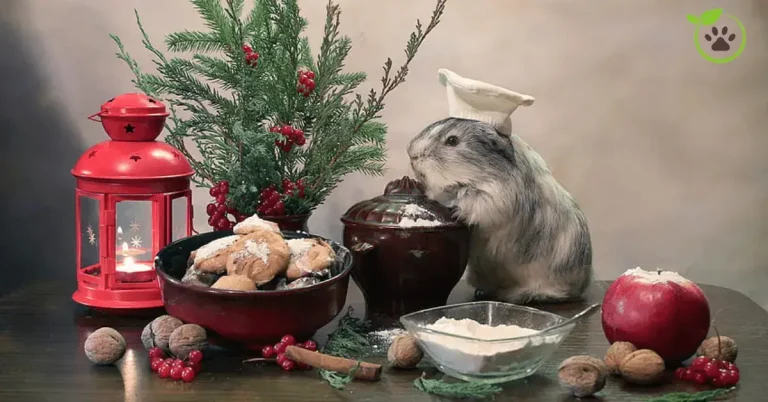I understand that as a pet owner, especially for small pets like Guinea Pigs, it can be tough to decide on new food. If you’re wondering can guinea pigs can eat pumpkin, the short answer is yes; they can safely enjoy the taste of this special treat.
Pumpkin is not only a delicious treat for your guinea pigs, but it is also nutritionally rich, non-toxic, edible, and completely safe if offered to them in moderation. People have been cultivating pumpkin for a long time, both for themselves and for their domestic animals.
Here is a comprehensive guide about pumpkins, covering their leaves, stem, raw form, seeds, and flowers to determine if they are safe for guinea pigs. They can derive nutritional benefits from various parts of the pumpkin and more.
Is Pumpkin Good for Guinea Pigs? | Health Benefits of Pumpkin
Pumpkin is a nutritional diet for humans, and it has many benefits for them. People are also curious about whether pumpkin, particularly its raw inside parts, is beneficial for guinea pigs or not. What are the health benefits of pumpkin for guinea pigs?
Here, we discuss some health benefits of eating pumpkin, including their leaves, stem, and other ingredients that are beneficial for guinea pigs.
Healthy Weight Management
Pumpkin is a great choice for guinea pigs due to its low-calorie content, which helps prevent obesity and weight fluctuations. The sweet taste of fresh pumpkin makes it not only delicious but also a healthy option, as it is low in fats. Choosing pumpkin ensures your guinea pigs enjoy a tasty treat without compromising their health.
Tip
Your pet’s weight is an important part of their healthy lifestyle.
Pumpkin is a great choice for your guinea pigs because it supports their healthy weight. It provides both quick and slow release energy, which is important for their daily needs. With minimal carbs and protein, pumpkin ensures that your guinea pigs get the right balance of nutrients for sustained energy throughout the day. It is a tasty and nutritious option to keep your pet cavy happy and healthy.
Antioxidant Powerhouse
Pumpkin acts as an antioxidant for guinea pigs because it contains Vitamin A, which works like a superhero in their bodies. It fights inflammation, prevent diseases, and keeps their bodies healthy. It also contains Vitamin E, which helps keep their skin healthy and may prevent cancer.
The antioxidants in pumpkin play a crucial role in keeping guinea pigs healthy. Especially, Vitamins A and E play important roles in their overall health and in boosting their immunity. It’s like a natural defense system for your pet.
Prevent Scurvy
It is a healthy treat for guinea pigs because it contains vitamin C, which is helpful in preventing scurvy a common problem they face. Although it doesn’t have as much vitamin C as some other fruits and vegetables, it is still a good and healthy supplement for them.
“Normal vitamin C levels for an adult guinea pig are 10mg/kg/day or about 20-25mg/day”
Guinea pigs cannot make their own vitamin C. They depend on vegetables and fruits, like arugula and other veggies, which are good sources of vitamin C. This vitamin helps prevent problems like fur damage and loss of appetite, which are signs of scurvy.
Blood Related Issues
It is a rich source of carotenoids like beta-carotene, alpha-carotene, lutein and zeaxanthin that help prevent eye problems in guinea pigs. These antioxidants, along with vitamins A and E, work together to support and protect their vision. So, feeding fresh pumpkin can be helpful in keeping their eyesight good.
Vital Nutrients in Pumpkin
- Vitamin A: It is essential for eyesight, hydration, and for skin problems especially beneficial for hairless guinea pig breeds.
- Vitamin C: It is a crucial nutrient that prevent infections and ensure overall health and wellbeing.
- Potassium: It keeps guinea pigs active, promoting regular growth and prevent illness.
- Fiber: High fiber content supports a healthy digestive system, ensuring guinea pigs remain active and maintain a proper sleep cycle.
Nutrition Facts of Pumpkin for Guinea Pigs
Pumpkin contain various nutrients. 100 grams of pumpkin contain nutrients that are given in table below:
| Nutrient | Amount per 100g |
|---|---|
| Water | 91.6 g |
| Energy | 26 kcal |
| Protein | 1 g |
| Total lipid (fat) | 0.1 g |
| Carbohydrate | 6.5 g |
| Dietary Fiber | 0.5 g |
| Sugars | 2.76 g |
| Calcium, ca | 21 mg |
| Iron, Fe | 0.8 mg |
| Magnesium, Mg | 12 mg |
| Phosphorus, P | 44 mg |
| Potassium, K | 340 mg |
| Sodium, Na | 1 mg |
| Zinc, Zn | 0.32 mg |
| Copper | 0.127 mg |
| Manganese, Mn | 0.125 mg |
| Vitamin C | 9 mg |
| Vitamin E | 1.06 mg |
| Vitamin A | 426 µg |
| Folates | 16 µg |
| Carotene, beta Carotene, alpha | 3100 µg 4016 µg |
| Lutein + zeaxanthin | 1500 µg |
Risks to Consider When Feeding Pumpkin to Guinea Pigs
Urinary Health Concerns
Pumpkin has a high amount of calcium, which is not good for guinea pigs urinary health. It is helpful for the bone development in young guinea pigs. However, if they are fully grown, excessive calcium intake can lead to issues like bladder stones, painful urination, blood in urine and urinary tract infections. So, if it is good for young guinea pigs, we need to be careful about how much pumpkin can be offered to grown-up guinea pigs.
Digestive Issues and Diarrhea
Pumpkin has a sweet taste and guinea pigs enjoy it as a treat. However, giving them too much can be a problem for their digestive system. It contains a lot of sugar and digesting too much sugar can be a challenge for their digestion.
Tip
Introduce any new foods gradually to allow your guinea pigs digestive system to adjust, so they don’t get sick.
This can result in stomach pains and diarrhea. To avoid these issues, like diarrhea and other stomach related problems, it is important to give them pumpkin in moderation.
Caution with Seeds
Guinea pigs eat pumpkin seeds and they are not harmful to guinea pigs. However, there is a risk that, while offering them seeds, they might get stuck in their teeth or throat because of their size.
Another thing to consider is that the seeds have a high amount of fat, which is not suitable for them due to their size. So, it is best practice to remove seeds before offering pumpkin to your guinea pigs to avoid any potential health issues.
High Sugar Content
It contains high sugar, especially pumpkin flesh, which has a fair amount of sugar. If they eat too much sugar, it can cause problems like tooth decay, constipation, and obesity. However, it does not contain as much sugar as other fruits and vegetables do, but it is still important to be cautious and give them in moderation.
Allergic Reactions
When you introduce new food to your guinea pig, like pumpkin, be careful for any signs of allergies. If you notice any signs of discomfort, consult your veterinarian if needed. Be cautious about the inner part, also called the inside of the pumpkin; skin and seeds can be a choking risk for them. Keep an eye on your guinea pigs while introducing new food to make sure it is a safe and healthy treat for them.
Serving Size and Frequency of Pumpkin for Guinea Pigs

How Much Pumpkin Can Guinea Pigs Eat?
Giving pumpkin to your guinea pigs is an important factor. You should offer it in moderation, keeping their age in mind, as the serving size for babies and adults is different.
- No specific quantity is specified for baby guinea pigs.
- Suggested serving size for adults is 1 inch cube of fresh pumpkin.
It is important to serve them in moderation to avoid health related issues. If you notice any sign of a stomach problem, then give them only a small handful or a few pieces at a time. Too much pumpkin can lead to problems like urinary issues, bladder or kidney stones.
It is best practice to offer them a small amount or mix 2-3 small pieces of pumpkin with other vegetables that are a rich source of vitamin C. This way, your pet can enjoy a small amount of this tasty treat and stay healthy. Always be careful about the serving size and quantity of their food to stay healthy.
How often can guinea pigs eat pumpkin?
Feeding a guinea pig a small amount of pumpkin is essential, but be careful about how often you give it. It is important not to give them pumpkin every day; only give it to them once or twice a week to avoid problems like sugar or calcium issues.
Guinea pigs need fresh hay and fresh water every day. Pumpkin doesn’t have enough vitamin C that cavies need, so mix it with other vegetables that have a lot of vitamin C. They only need 10 to 30 mg of vitamin C every day. Therefore, mixing pumpkin with other vegetables like broccoli or cucumber is key to a balanced diet.
What Part of a Pumpkin Can Guinea Pigs Eat?
Here, we will discuss which parts of the pumpkin are safe for guinea pigs. Are seeds, leaves, stem, flowers and raw pumpkin safe for them? Do they like to eat them or not?
Can Guinea Pigs Eat Pumpkin Seeds?
No, guinea pigs do not eat pumpkin seeds due to their size and choking hazards. However, they are a rich source of protein, fats, and iron, which are beneficial for humans. But these seeds are tough for guinea pigs to chew and may get stuck in their throat due to their size.
While the seeds are not poisonous for them, the risk of a choking hazard makes them unsuitable. Cooked or dried seeds are also not recommended because their stomachs are not suitable for processed food. It is important not to include any kind of pumpkin seed in their diet for their overall health and well being.
Can Guinea Pigs Eat Pumpkin Skin/Pumpkin Peel?
Yes, it is okay to leave the pumpkin skin when serving it to them. More studies clearly define that the skin has more nutrients than pumpkin flesh. It has high antioxidants, minerals and fiber.
It is completely safe to feed pumpkin skin to your guinea pigs because it has a lot of benefits. Keep in mind that the skin is properly cleaned before serving, as there may be many hazards and fertilizers during their growth. It is health beneficial and also very important for their teeth.
Can Guinea Pigs Eat Pumpkin Leaves?
Yes, guinea pigs can eat pumpkin, especially the leaves. They’re full of good things like Iron, Calcium, Vitamin C, Vitamin A, and Vitamin B, which are good for their health. Just be careful not to give them too much.

Because the leaves are full of calcium, it is not suitable for them if fed in excessive amounts. Also, make sure that the leaves are washed and prepared properly to minimize the risk of any kind of hazard. Choose fresh and young leaves to ensure nutritional benefits.
Can Guinea Pigs Eat Pumpkin Guts/Pumpkin Pulp?
Yes, guinea pigs can eat pumpkin guts or pulp because it has many nutritional benefits. The pulp consists of carotene, lutein, zeaxanthin, minerals and vitamins. The important part of the pulp is that it consists of vitamins A, C, and E which are very beneficial for guinea pigs. Keep in mind to remove all seeds before serving this part to your guinea pigs.
Pumpkin Flesh, Flowers and Stem
Guinea pigs eat pumpkin and enjoy various parts of the pumpkin, including the flesh, flowers and leaf stems. Pumpkin flesh rich in nutrients should be served in moderate amounts to avoid overfeeding. Pumpkin flowers with a slightly sweet taste and high vitamin C content are safe for guinea pigs but should also be given in moderation due to their calcium content.
Pumpkin leaf stems are a preferable option over the hard pumpkin stem promoting healthy teeth. However, it is essential to remove spikes from the stems and offer them in small portions. On the other hand, the hard stems of the pumpkin lack nutritional benefits and may be challenging for guinea pigs to digest so they should be avoided in their diet.
How to Prepare the Pumpkin for our Guinea Pigs?
Feeding pumpkin to your guinea pig doesn’t have to be a tough task. You can easily offer pumpkin to your guinea pigs by following these instructions.
- Ensure the pumpkin is properly washed to eliminate dirt and any unwanted chemicals.
- Peel off their skin and offer only pulp to reduce the risks of any kind of health issues.
- Remove seeds to prevent any potential issues in the throat and choking hazards.
- Serve pumpkin only raw because cooking food is not suitable for guinea pigs.
- Make sure to give them only in moderation to avoid stomach problems.
- Mix it with other vegetables to create a balanced diet for guinea pigs.
Follow these steps to keep your guinea pigs healthy and live longer.

Quick Facts About Pumpkins
Here are some quick facts about pumpkin:
- Pumpkins, often thought of as vegetables, are actually fruits, along with cucumbers, tomatoes, and avocados, originating from the flowers of their plants.
- Pumpkins belong to the winter squash family, and all squashes are technically fruits.
- Each pumpkin contains approximately 500 seeds.
- Pumpkins take 90 to 120 days to reach maturity once they sprout.
- There are over 45 different types of pumpkins, including names like Baby Bear, Spooktacular, Ghost Rider, Tricky Jack, and Sweetie Pie.
- The Atlantic Giant is the largest pumpkin species, capable of growing up to 50 pounds per day.
- Pumpkins are considered fruits, a surprising fact.
- The name “pumpkin” originates from the German word “pepon,” meaning “large melon.”
- Pumpkin seeds are packed with health benefits, containing vitamins, minerals, and unsaturated fatty acids.
- Pumpkin flowers are edible.
- Pumpkins are grown on every continent except Antarctica.
- About 90% of a pumpkin is water.
- Leading pumpkin-producing states in the U.S. include Illinois, Ohio, Pennsylvania, and California.
- 80% of the U.S. pumpkin crop is available in October.
- To be ready for Halloween, pumpkins must be planted between late May to early July, depending on the location.
Frequently Asked Questions FAQ’s
Do guinea pigs eat raw pumpkin?
Yes, guinea pigs eat raw pumpkin. Because guinea pigs are herbivores and they can safely enjoy raw pumpkin along with other fresh fruits and vegetables.
Can Guinea Pigs Eat Canned Pumpkin or Pumpkin Puree?
No, guinea pigs cannot eat canned pumpkin or pumpkin puree. This form of pumpkin is processed and as mentioned earlier, guinea pigs do not consume processed or baked food as their digestive systems are highly sensitive and unable to process cooked food.
During the puree process additional sugar and other ingredients are often added. Which is not recommended or suitable for guinea pigs. This is why guinea pigs do not eat pumpkin puree or canned.
Can Guinea Pigs Eat Butternut Pumpkin?
Yes, guinea pigs can easily consume Butternut Pumpkin, also known as butternut squash, because it consists of a lot of vitamins and other minerals that guinea pigs need. However, give them butternut only in moderation because it has a lot of calcium.
Can Guinea Pigs Eat Kent Pumpkin?
Guinea pigs can eat Kent pumpkin. It is a type of Jap pumpkin with green and grey skin and tasty yellow to orange flesh. It contains antioxidants and beta carotene which play an important role in helping guinea pigs stay healthy, especially for their eyes and overall health and well being.
Can Guinea Pigs Eat Mini Pumpkins?
Guinea pigs can enjoy mini pumpkins, which are small versions of large pumpkins. These mini pumpkins are tasty and nutritious, providing essential nutrients for guinea pigs. To keep guinea pigs happy and healthy, it is essential to offer mini pumpkins in moderation.
Can Guinea Pigs Eat Pumpkin Pie?
No guinea pigs can not eat pumpkin pie because it is a type of baked or process food. Processed food is not suitable for guinea pigs because they have very sensitive digestive system. Pie is also full of carbs, calories, fat, and sugar.
It also contains flour, milk and sugar that is not suitable for guinea pigs and they can not eat pumpkin pie.
Can Guinea Pigs Have Pumpkin Spice Latte?
No, guinea pigs cannot have a pumpkin spice latte because it consists of excessive amounts of carbs, sugars, and calcium, with a minimal amount of vitamin C and other essential minerals. The only suitable drink for guinea pigs is fresh water.
Conclusion
Pumpkin is not toxic and is a safe, healthy treat for your guinea pigs. Only offer them in moderation, following the instructions to avoid any hazards or potential health risks. Provide them with 1-2 pieces once or twice a week follow these instructions to support your pet’s health.






